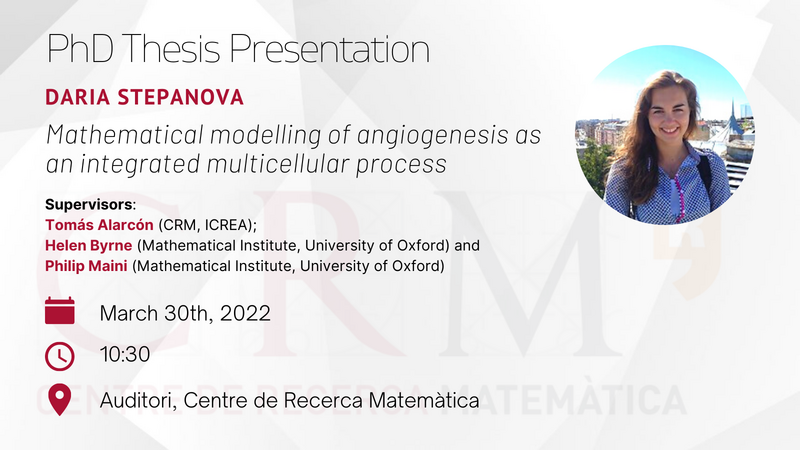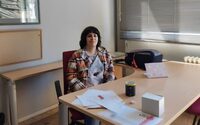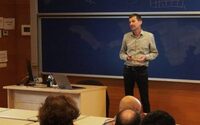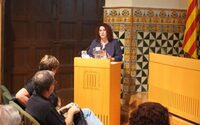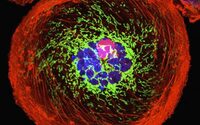The defence will take place in the Auditorium of the CRM on Wednesady, March 30th, 2022.
Daria Stepanova has conducted her PhD project as part of the Cancer Modelling Research Group at CRM, under the supervision of Tomás Alarcón (CRM, ICREA), Helen Byrne (Mathematical Institute, University of Oxford) and Philip Maini (Mathematical Institute, University of Oxford).
PhD Thesis Title: Mathematical modelling of angiogenesis as an integrated multicellular process
Abstract: Angiogenesis, the formation of new blood vessels from pre-existing ones, is essential for normal development and plays a crucial role in such pathologies as cancer, diabetes and atherosclerosis. In spite of its extensive research, many aspects of how new vessels sprout from existing vasculature remain unclear. Recent experimental results indicate that endothelial cells, lining the inner walls of blood vessels, rearrange within growing vessels and that sprout elongation is dominated by cell mixing during the early stages of angiogenesis. Cell rearrangements have been shown to be regulated by dynamic adaptation of cell gene expression, or cell phenotype. However, most theoretical models of angiogenesis do not account for these phenomena and instead assume that cell positions are fixed and cell phenotype is irreversible during sprouting.
In this thesis, we formulate a multiscale model of angiogenic sprouting driven by dynamic cell rearrangements. Our model accounts for cell mixing which is regulated by a stochastic model of subcellular signalling linked to phenotype switching. We initially focus on early angiogenic sprouting when the effects of cell proliferation are negligible. We validate our model against available experimental data. We then use it to develop a measure to quantify the amount of cell rearrangement that occurs during sprouting and investigate how the branching structure of vascular networks changes as the level of cell mixing varies. Our results suggest that cell shuffling directly affects the morphology of growing vasculatures. In particular, rearrangements of endothelial cells with distinct phenotypes can drive changes in the network structure since cell phenotype adaptation is slower than cell migration. Cell mixing also contributes to remodelling of the extracellular matrix which, in turn, guides vascular growth.
In order to investigate the effects of cell proliferation, which operates on longer timescales than cell migration, we first develop a method, based on large deviation theory, which allows us to reduce the computational complexity of our hybrid multiscale model by coarse-graining the internal dynamics of its cell-agents. The coarse-graining (CG) method is applicable to systems in which agent behaviour is described by stochastic systems with multiple stable steady states. The CG technique reduces the original stochastic system to a Markov jump process on the space of its stable steady states. Our CG method preserves the original description of agent states (instead of converting them to discrete ones) and stochastic transitions between them, while considerably reducing the computational complexity of model simulations.
After formulating the CG method for a general class of hybrid models, we illustrate its potential by applying it to our model of angiogenesis. We coarse-grain the subcellular model, which determines cell phenotype specification. This substantially reduces the computational cost of simulations. We then extend our model to account for cell proliferation and validate it using available experimental data. This framework allows us to study network growth on timescales associated with angiogenesis in vivo and to investigate how varying the cell proliferation rate affects network growth.
Summarising, this work provides new insight into the complex cell behaviours that drive angiogenic sprouting. At the same time, it advances the field of theoretical modelling by formulating a coarse-graining method, which paves the way for a systematic reduction of hybrid multiscale models.

CRM Comm Team
Anna Drou | Paula Lomascolo | Pau Varela
CRMComm@crm.cat
El CRM participa a la Setmana de la Ciència
Entrevistamos a Kristina Oganesyan, doctoranda del CRM
En esta entrevista, conversamos con Kristina Oganesyan, quien en marzo de 2024 defendió su tesis doctoral titulada "Three problems in harmonic analysis and approximation theory" bajo la dirección de Sergey Tikhonov. Kristina nos comparte su...
Nicolas Brunel’s Seminar on Cortical Network Dynamics at CRM
Nicolas Brunel, CRM Scientific Advisory Board member, delivered a seminar on the roles of inhibition in cortical network dynamics as part of the Barccsyn Seminar Cycle. He presented findings on how inhibition stabilizes neural activity and shapes...
Xavier Tolsa, Premi Nacional d’Investigació 2024
Xavier Tolsa, professor ICREA al Departament de Matemàtiques de la UAB i adscrit al CRM, ha rebut el Premi Nacional d'Investigació 2024 en la modalitat Julio Rey Pastor pel seu treball en àrees com l'anàlisi harmònic i la teoria geomètrica de...
Eva Miranda Awarded Prestigious Gauß Professorship
The Gauß Professorship, awarded by the Göttingen Academy of Sciences and Humanities, is a prestigious recognition given to scientists who excel in fields significant to Carl Friedrich Gauss, such as mathematics, physics, astronomy, and geophysics....

